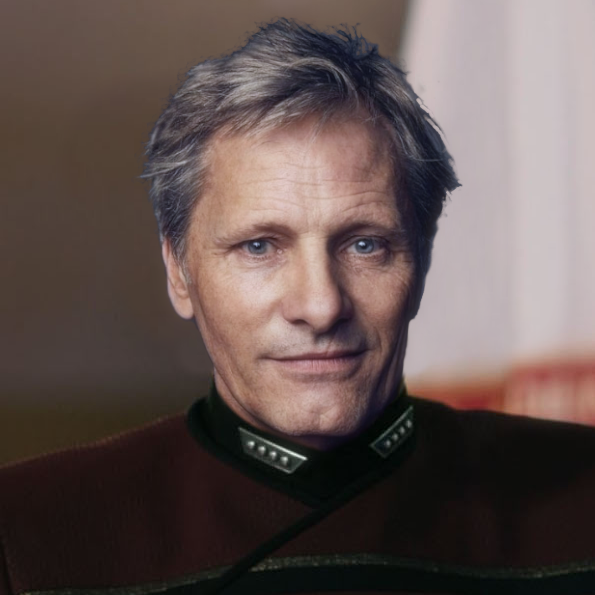“Someday, you’ll accept I’m usually right,” Dr. Brooks smirked at Commodore Larsen before turning towards Fleet Admiral Reyes. “Allison, if you want to solve this, we need to go down there.” With the limits of observation reached and the alternatives to action expended, there really wasn’t another choice. Plus, in a lone moment of clarity, Line Chief Jax had already confirmed he’d be going. It was only a matter of time.
“I’m sorry, Tom, but I still disagree,” Commodore Larsen insisted. “We can’t even fly a probe down there, let alone a shuttle, without crashing it, and we have no idea what those temporal micro-fractures could do to the human body.” She couldn’t support sending an away team into the chronometric spaghetti bowl on the fragmented testimony of a man suffering from severe temporal dissociation.
“Look at me, Liv,” Dr. Brooks scoffed, opening his arms wide as if presenting himself. “I am the result of such fractures yet, to the disappointment of many, temps and uptime alike, here I am.” Line Chief Jax was not the only person to ever step through the frames of time.
Commodore Larsen frowned. She appreciated the old man’s brilliant mind, and she understood he had experiences none of them shared, but that didn’t change that he was far too reckless. That this was far too reckless. “I still can’t support it.”
Dr. Brooks didn’t really care if she supported it though. The commodore wouldn’t be the one to make the final call. Again, he looked back over at Fleet Admiral Reyes. “Based on the testimony from Line Chief Jax, we can infer a gradient in skip periodicity, intervals between discontinuities tightening with increasing depth. That kind of compaction suggests the anomaly is structured, not stochastic, and that a locus exists. Our next step should be to seek it out.”
“A light under the rock?” Dr. Lisa Hall repeated back what the Choradian had said to them. “The point where it sang?” Quite a lot to hang on the jumbled words of a man who couldn’t get his tenses right, but she’d deployed on far less before.
“Exactly,” nodded Dr. Brooks. “What he describes is not chaos. It’s architecture.” His eyes were alight, a man who reveled in the strange and the exotic, the places where the edges of reality bent. “And I’d very much like to meet the architect.”
“The line chief did not offer much to go on,” cautioned Captain Titus Bishop. He’d listened in detail to what Dr. Brooks and Dr. Hall had recounted, but it was quite obscure, and the witness was certainly not in a credible mental state. “He did not offer enough specificity to provide the basis for a safe deployment to the surface… nor for an extraction.” The captain had been particularly disturbed by the astrophysicist’s hypothesis of how Line Chief Jax had escaped.
“Where’s your sense of adventure, Titus?” Dr. Brooks chuckled, but the squadron’s strategic operations officer just stared back stoically. Captain Bishop hadn’t gotten where he was by gambling the farm. “Ah, that’s right. All precision and no poetry, hmm?”
“Something like that,” Captain Bishop nodded as he folded his arms across his chest.
“I’m all for a grand adventure,” Fleet Captain Gérard Devreux jumped in. “But I’m afraid that here, I’m with Commodore Larsen and Captain Bishop. You’ve got nothing more than confused ramblings and colorful descriptions of a tangled mind.”
“You’re right, Gérard,” Dr. Brooks sighed. “Just garbled sensor telemetry, a madman’s testimony, and a lot of speculation.” But then, once more, he turned back to Fleet Admiral Reyes. It would ultimately be her choice in the end, and he knew how to appeal to her sense of purpose and duty. “Sometimes, gut sense and informed speculation is the only way forward, and when the alternative is to leave Chorad IXa to its nightmare, can we really do anything but try?”
Allison Reyes was not the type to sit idle when there were people in need, and where she’d previously been leaning in favor of her senior staff, Dr. Brooks’ point struck a chord. “Suppose we were to consider it. How could we ensure the safety of our away team?” That was the duality she was grappling with. On one side, the Choradians needed them to solve this, but on the other, she’d buried far too many on her crusade to save the galaxy.
“You can never ensure the safety of anyone,” Dr. Brooks reminded her. “You know that as well as any.” He hadn’t meant the words to sting, but as they came out of his mouth and he saw the change in her expression, he realized he probably could have said it more diplomatically. Still, onward he pressed. “But what we can do is minimize the risk.” He walked over to a console and pulled up a schematic. “Meet my latest creation.”
Around the room, the Polaris senior staff and ASTRA researchers stared at the design on the monitor. It was a small cylindrical device roughly the length of a small PADD, accompanied by spacetime tensors only the most seasoned astrophysicists had a chance at understanding.
While most had no idea what they were looking at, the Klingon astrophysicist from Mempa V understood almost at once. “You are full of surprises, old man,” Voragh chortled as he patted the astrophysicist on the back a bit more heartily than Dr. Brooks would have preferred. “A clever way to avoid being resected by the chronometric fractures.”
Lieutenant Commander Sena took a bit longer, but eventually she got there too. “Impressive indeed,” she acknowledged, a rare compliment from the Tal Shiar operator turned Starfleet xenotechnologist. This was beyond anything her former employer had ever even hypothesized, and he’d conceived this in less than two days?
“Care to enlighten the rest of us?” Fleet Captain Devreux inquired.
“It’s a mobile chronometric anchor tuned to an external reference frame to avoid phase splitting within a hyper-local proximity,” Dr. Brooks replied, as if it made perfect sense. “Think of it as a harmonic counterweight, maintaining synchronization of time within a small pocket of space around the wearer.”
“To avoid seeing what happens when half your body is a day older than the other half,” Voragh chuckled, almost amused at the idea.
“And to keep an away team from finding themselves split across time,” Lieutenant Commander Sena added. “Hard to coordinate when you’re each stepping through different moments.”
“Theoretically,” Commodore Larsen reminded the group. “This is all just theory.”
“It’s always a theory until you put it to an experiment,” Dr. Brooks countered.
“And we’re the experiment?” Captain Bishop frowned.
“You can make your own choice, my friend,” Dr. Brooks smiled. “But me and Doc Hall, we’re going.” He said it as though it was already decided.
“Dr. Hall?” Fleet Captain Devreux inquired as he turned towards the cold psychologist. He knew her to be a boots-on-the-ground sort of person, but he hadn’t heard her volunteer.
Dr. Hall, though, looked as unphased as ever. “It’s already written in time, I suppose,” she nodded. That’s what Line Chief Jax had told them, and why fight fate? Plus, it was probably for the best. This anomaly might trigger a presentation of Dr. Brooks’ own disorder, and if anyone was still alive down there, it’d offer an interesting study of how a loss of causal linearity impacted a larger societal cohort. “So yes, I’ll be going.”
For a moment, the room was quiet as the gravity shifted.
“Depending on what awaits us down there, my skills may be useful,” Lieutenant Commander Sena offered. “Color me intrigued enough to join.” If the source was anthropogenic in nature, it would require study, for the good of all their peoples, as it would transcend anything any of the Alpha and Beta Quadrant powers possessed.
Voragh was the next to jump in. “I won’t be the first Klingon to fear that which a Romulan does not,” he smiled. “So I’m in too.” It wasn’t just bravado either. The universe was full of mysteries waiting to be defeated, and this certainly fit the bill. He wouldn’t shirk away from the opportunity.
Commodore Larsen frowned as she realized she’d lost the room. At least it was just the mad folk though, the loose cannons she knew she’d never fully be able to control… Or so she thought until an unexpected voice spoke up.
“I can’t make heads from tails in your equations,” offered Lieutenant Commander Taylor. “But if you’d like an extra pair of hands, mine are plenty calloused, and I’d be happy to tag along.”
“Sebastian?” Commodore Larsen looked over at the xenoarchaeologist with surprise.
“I don’t know about any of you, but I came out here to see the unknown, and I can’t imagine anything much more unknown than this,” Lieutenant Commander Taylor replied coolly. “Plus, have any of you, in modernity, seen a civilization capable of achieving what we see down there?” Of course, none of them ever had. “It stands to reason, then, that this is either something from beyond known space or something from our galaxy’s ancient past. Either way, I’m with Dr. Brooks here. I’d quite like to learn more about the architects of this phenomenon.”
A smile formed on Fleet Admiral Reyes’ face, much to the chagrin of those among her senior staff that’d been trying to steer clear of such brash action. “Then it sounds like we’ve got a plan and a team.”
“That you do,” Dr. Brooks nodded with satisfaction. “We’ll fabricate and test the anchor designs tonight, but assuming no significant faults are identified, we’ll depart tomorrow, 1400 hours.”
“Then the matter is settled,” Fleet Admiral Reyes closed. She had willing volunteers, and she wasn’t going to just sit idle with the fate of a colony in the balance. Nothing anyone would say would change her mind.
“As much as I worry I may regret offering, Dr. Brooks,” Captain Bishop pivoted to a more practical point. “Shall I arrange an escort from Lieutenant Commander Ryder’s team?”
“There’s no need,” Dr. Brooks replied as he glanced at the burly Klingon, the former Tal Shiar operator, the rugged frontiersman, and the cold psychologist. “Even if things get hot, I suspect we’ll be able to handle ourselves.”
A look of relief spread across Captain Bishop’s face. While protocol dictated it, truly, he had not wanted to send any of his people along on this half-baked scheme.
“Besides, Titus,” Dr. Brooks added. “While you may think me reckless, I’m no fool. No need to throw good people after us. If I’m wrong and it all blows up in our faces, if it’s only us, there will be few to mourn our passing.”

 Bravo Fleet
Bravo Fleet








